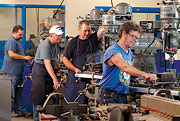 |
For years now, the sound from North Carolina industry — traditional industry, at any rate — has been more funeral dirge than fanfare. Globalization, NAFTA, outsourcing, plant closings, you name it: The news hasn’t been good.
Meanwhile, a major change has quietly been taking place in the industrial sector. As textiles and furniture manufacturing have slipped away, a diverse mix of other skilled industrial jobs has cropped up in their place. And local experts maintain that they’re not terribly hard to get if you’re willing to retrain — and, in some cases, shift expectations.

Tricks of the trade: Students in A-B Tech’s machinist program are bringing their skills to local manufacturing. courtesy A-B Tech
|
Gil Walker, who owns the Express Personnel Services franchise in Asheville, says he places roughly 20 applicants in manufacturing jobs each week and sometimes twice that many.
“I believe we’re headed for a better day,” says Walker. “There are a number of big industrial firms which have a commitment to keeping jobs in Western North Carolina, and there are quite a few with plans for expansion in place.”
Witness the Volvo heavy-equipment plant in south Asheville, which last month announced 265 new jobs. Last summer, BorgWarner in Arden rolled out 110 new jobs.
That the traditional heavies of Tar Heel industry are having a tough time is hardly cause for celebration, especially in the Piedmont and mountain regions. But the good news is that losses in traditional manufacturing are being offset, to some degree, by gains in “new” manufacturing. And while these jobs tend to require more specific skills, they also offer considerably higher wages than the assembly-line jobs of the past.
“Manufacturing is undergoing a transformation here,” says Tom Tveidt, director of research for the Asheville Area Chamber of Commerce. “On one hand, the loss of lower-skilled jobs is quite real, but there is also a growth of higher-skilled jobs.”
From 2004 to 2005, he notes, the four-county Asheville Metropolitan Statistical Area (Buncombe, Haywood, Henderson and Madison counties) lost 420 jobs in furniture manufacturing. The average annual wage for that sector was $26,762 (down a hefty $7,827 from the previous year).
Yet during that same period, machinery manufacturing gained 151 jobs, and average annual wages in that industry were an impressive $50,239 (up $2,803 from the year before). True, there were still more jobs lost than gained, but the people holding those new jobs are earning substantially more than most workers in the region.
This summer has seen surprising growth in manufacturing jobs, stirring the sector from a nearly decadelong doldrums. “For the last three months the numbers have been up, in aggregate, 600 jobs. We haven’t seen a rise like that since 1997,” says Tveidt, adding that the growth is coming mainly in plastics, machinery and electronics manufacturing.
According to the U.S. Bureau of Labor Statistics and the North Carolina Employment Security Commission, manufacturing accounts for 13 percent of the jobs in the Asheville metro area, employing more than 21,000 workers.
Shifting gears
So where do the workers go when a local factory shuts its doors forever? Good question, says Walker.
“We see a lot of people who’ve worked at a plant for 20 or 30 years, and they’re wondering, ‘What now?’ In a lot of cases, they can get a job pretty easily. But they’ve got to be willing to be flexible, to learn new skills. And unfortunately, often they have to be willing to take a pay cut, at least at first.” (Workers in old-school manufacturing — especially union workers — pulled down wages that were inflated by current business standards, says Walker.)
Training opportunities are one antidote to despair. A-B Tech, for instance, offers both certification courses and associate’s degrees in the industrial arts, including machining, a skill which Technical and Industrial Training Coordinator Nancy Troxler says “is in huge demand” in Western North Carolina.


Before you comment
The comments section is here to provide a platform for civil dialogue on the issues we face together as a local community. Xpress is committed to offering this platform for all voices, but when the tone of the discussion gets nasty or strays off topic, we believe many people choose not to participate. Xpress editors are determined to moderate comments to ensure a constructive interchange is maintained. All comments judged not to be in keeping with the spirit of civil discourse will be removed and repeat violators will be banned. See here for our terms of service. Thank you for being part of this effort to promote respectful discussion.